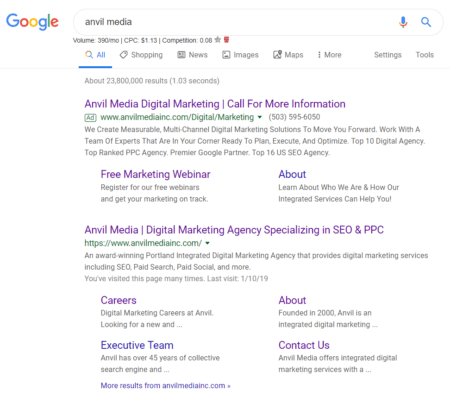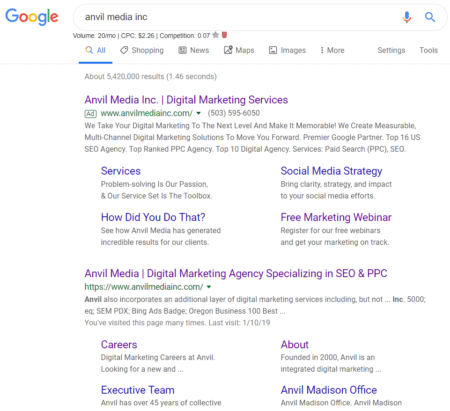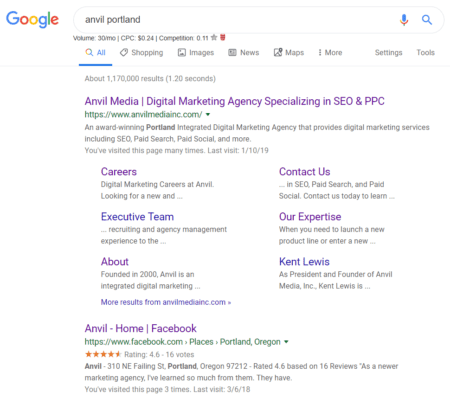Not long after Google unveiled AdWords in 2002, companies have had the option to buy branded terms. Unfortunately, many organizations have elected not to purchase their own company, product or service-related terms for a variety of reasons, primarily because an organizations’ website already ranks #1 in organic search results for those terms and feels they can save money by investing elsewhere. I believe this is logical, but short-sighted thinking. In this article, I outline at least five reasons to buy branded terms in paid search.
1. Protect Your Brand
The most important reason to buy branded terms in paid search is to protect your brand. From a legal standpoint, advertising creates goodwill. Influential brands that have not adequately advertised in the past have lost their names to public use, like Escalator. Another prudent reason to buy your brand name is to hedge against competitors. Your competitors are less likely to advertise on your brand if you’re already there, and it gives you more leverage with Google, should you choose to contest any improper advertising on your branded terms. Since 15% or fewer of searches result in an ad click, most searches will not cost your company anything, yet you still generate key visibility.
2. Manage Your Reputation
Ads on Google and other search engines utilize primary real estate to maximize revenue. One of the benefits of buying your brand terms, is controlling the valuable real estate on search engine results pages (SERPs). While brands typically rank organically in the first position, buying that same branded term effectively pushes down the results you don’t directly control, including press coverage, review sites like Yelp or Glassdoor and other potentially unfavorable content. We know from past research that the top 3 positions on SERPs generate many of the clicks (and thus, views), so manage “the fold” to your advantage.
The images below are screen grabs of branded searches for my digital marketing agency, Anvil Media. Only our ad and the top organic listing appear above the fold, the rest of the organic results (#2-10) are below the fold and out-of-sight. In effect, we control 100% of the above-the-fold brand experience.


By comparison, a similar search without an ad generates two organic listings above-the-fold. Fortunately, this search generates our company Facebook page at #2, which has a reasonably high rating, but that may not be the case for your brand searches. This is particularly important if your ratings and reviews are less-than-stellar.

3. Enhance Performance
According to research by 3Q Digital, MOZ and MarketingProfs, advertising on branded terms can increase click-through rates (CTRs) on the top organic position (when it’s the same brand) by 10-20 percent. Perhaps seeing the ad builds confidence in the searchers mind, but they tend to click on the “trusted” organic listing more often than the ad. The benefits of this behavior include an increase in organic traffic from branded search, as well as an improved QualityScore, as branded terms are lower in the sales funnel and convert at a higher rate. The focus on optimizing for and buying into branded search may also impact search demand and increase opportunities for improved visibility.
4. Increase Revenue
As mentioned previously, branded search ad campaigns perform well and often lift your AdWords QualityScore. Beyond improved CTRs, branded campaigns perform well down the funnel at the conversion level. For ecommerce brands, that means instant revenue and for B2B brands, that implies a larger sales lead pipeline with a high return-on-investment (ROI). Part of the reason branded terms perform so well (for 99 percent of companies on the planet), is because the search volume and competition levels are low. While an industry term cost-per-click (CPC) $20, a branded term may only cost $.50. Most importantly, the traffic generated by branded search is familiar with your brand, and thus higher quality.
5. Test Messaging
One of the lesser known benefits of buying branded terms is the ability to test. Paid search provides a somewhat unique opportunity to affordably test messaging in the text ad copy and in the associated landing pages. More companies should take the opportunity to use branded search ads to proactively and systematically test and refine key messaging, benefits and offers. The additional benefit of the paid search environment is the control a brand has over the search experience. From an initial branded search through the landing page, companies can influence outcomes and learn in the process.
With the recently increasing interest in customer journey and omnichannel marketing, brands should make a concerted effort to leverage paid search to impact brand perception and drive traffic and revenue.

Kent Lewis founder of pdxMindShare, an online career community and networking group mentioned on Seth Godin’s blog. Formerly a CMO and founder or co-founder of multiple agencies, he’s known as a thought leader in digital marketing. He’s been an adjunct professor for more than 20 years at Portland State University and a volunteer instructor for SCORE. Lewis co-founded SEMpdx in 2006, a trade organization for search engine marketing professionals. His recognition includes Marketer of the Year by the American Marketing Association and Top 100 Digital Marketing Influencers by BuzzSumo.
